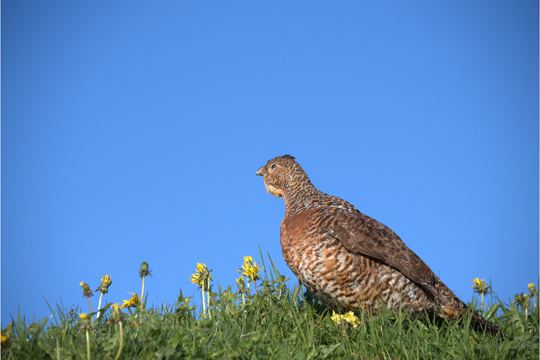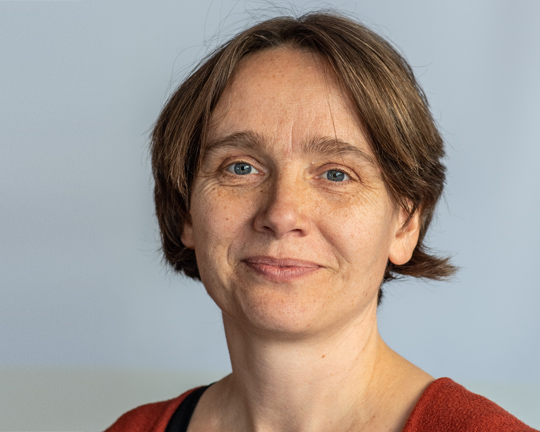The freedom to experiment
Freiburg, Feb 05, 2021
The Knowledge Dialogue has reached its completion. Following the first three years of funding, the state of Baden-Württemberg has approved funds for an additional two years. Working closely with stakeholders from the national park region, researchers from the Faculty of Environment and Natural Resources of the University of Freiburg together with researchers from the Rottenburg University of Applied Forest Sciences, the Forest Research Institute Baden-Württemberg and the Ökoinstitut e.V. greatly enjoyed accompanying the Black Forest National Park’s beginnings from 2015 to 2020. Annette Hoffmann spoke with the project’s managing director Dr. Regina Rhodius from the Chair of Remote Sensing and Landscape Information Systems about the freedom of research and its limitations, knowledge labs and the grouse.
 Advertising with the wood grouse: The Northern Black Forest National Park adopted concepts developed by researchers at the University of Freiburg on the perception of wildlife. Photo: MEISTERFOTO/stock.adobe.com
Advertising with the wood grouse: The Northern Black Forest National Park adopted concepts developed by researchers at the University of Freiburg on the perception of wildlife. Photo: MEISTERFOTO/stock.adobe.com
The Knowledge Dialogue Northern Black Forest was one of the field test labs funded by the State of Baden-Württemberg. Are they more of a pleasure or a plight for research?
Regina Rhodius: Primarily a great deal of pleasure. The term “field test lab” demonstrates that scientists conduct their research within the context of everyday human experience, which leads to very interesting encounters. The nice thing is people are allowed a great deal of freedom to try out new approaches. But a research group should realize what it is getting into. Field test labs require a great deal more communication and self-reflection. If you don’t consider that, this type of research can turn into a plight after all.
Do field test labs represent the changing role of universities in which research must now contribute to the sustainable development of society?
Field test labs serve inward and outward change toward a sustainable development of a given region and toward a new type of collaboration between universities and society. In the early phases of field test labs, there was a concern in academic that science would be hitched too tightly to a political agenda, thereby reducing researchers’ freedom. But I don’t see competition between basic research and field test lab research. Both have a certain justification. It is also a kind of freedom to be given societal leeway to try out solutions to problems in the field test lab.
When the Knowledge Dialogue Northern Black Forest first started, it coincided with the Black Forest National Park’s founding, which was rather controversial in the area. Did you get caught up in that conflict?
The National Park was just over one year old when we started with our research in the field test lab. As a result, we had to be very careful and sensitive. Researchers tend to feel they are neutral and independent from everything else. But if you enter such a region as this one, people view you as a political stakeholder. The National Park had to first establish itself. We couldn’t afford being seen as troublemakers. It required a great deal of negotiation. We offered a platform for various stakeholders. With the series “Knowledge Dialogue on Site,” we were able to address issues and engage in critical discussion. It was very well received.
 First research, later more teaching: "During the course of the field test lab, we realized that we had to adapt our concept," explains Regina Rhodius, who led the project "Knowledge Dialogue Northern Black Forest". Photo: Patrick Seeger
First research, later more teaching: "During the course of the field test lab, we realized that we had to adapt our concept," explains Regina Rhodius, who led the project "Knowledge Dialogue Northern Black Forest". Photo: Patrick Seeger
Does studying forest sciences prepare you to conduct research in such a conflict-ridden field?
There are approaches, such as modules that are designed as project studies in which students work on problems in small groups. In one of our modules, the students were given practical tasks. For example, someone came from the administration of the Freudenstadt district looking for ideas for implementing a tourism concept. The students not only had me as their contact person, but also the person who had posed the question. And in the end, at the public presentation of the results, we were surprised how positively the students' ideas were received in the region, much more openly than, for example, ideas from the expert teams. In the second funding phase, we therefore focused on teaching. During the course of the field test lab, we realized that we had to adapt our concept because collaboration between students and practitioners takes more time. We are currently writing a teaching concept in which we are advocating a two-semester module. You need a certain continuity to achieve quality and it is tiring for practitioners when they are confronted with new faces every quarter. The students have experienced first-hand what it means to work in a politically sensitive environment, which will certainly be beneficial for their future careers.
The project has been completed. How does the knowledge generated in each project become sustainable beyond the final volume itself?
We started with seven subprojects, later there were nine. This breadth enabled many people from the region to connect with us, and each subproject has a result that benefits the region. Individual forest therapy services that were designed are already being implemented, and the area set up to observe wilderness development continues to be managed by the National Park. Researchers have examined charcoal remains from old piles and were able to tell what the tree species composition in the forest used to be like. This is a historical topic that is still highly relevant today, for example, when it is discussed whether spruce belongs in the Northern Black Forest or not. The National Park is about protecting fragie animal and plant species, often advertising itself using the image of the grouse. But the powerful grouse looks like it needs no protection. After a research team looked into the perception of wildlife, the national park is now drawing attention to itself using a wood grouse and chicks or a woodpecker. And we are very pleased that the district of Freudenstadt is currently examining how it can integrate sustainability ideas developed by our students as part of its concept for a sustainable district.
The Knowledge Dialogue Northern Black Forest was funded through the State Ministry of Science for Baden-Württemberg under the aegis of the program “Science for Sustainability”. Frau Prof. Dr. Barbara Koch from the Faculty of Environment and Natural Resources of the University of Freiburg holds the position as program director.
A volume of essays presents the nine subprojects of the Knowledge Dialogue Northern Black Forest and thus provides an insight into historical forest use and forest development. In addition, the project staff also explain the problems of local public transport in rural regions or the establishment of health tourism. Beyond the presentation of the individual projects, the volume also represents an exemplary introduction to the topic of field test labs.
A volume of essays “Wildlife, Forest, Humans” (in German):
Rhodius, R., Bachinger, M., Koch, B. (Hrsg.) (2020): Wildnis, Wald, Mensch. Forschungsbeiträge zur Entwicklung einer Nationalparkregion am Beispiel des Nordschwarzwalds. München.

